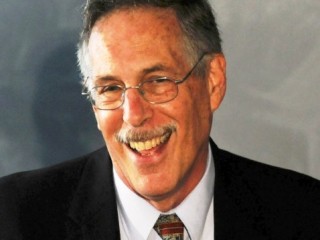
Peter Diamond biography
Date of birth : 1940-04-29
Date of death : -
Birthplace : New York City, New York, U.S.
Nationality : American
Category : Politics
Last modified : 2011-09-15
Credited as : economist, U.S. Social Security policy, Nobel Prize for Economics
0 votes so far
Peter Diamond is an economist at MIT, who shared the 2010 Nobel Prize for Economics with Dale Mortensen and Christopher Pissarides, "for their analysis of markets with search frictions". His areas of expertise include the economics of uncertainty, growth, optimal taxation, pension issues, public finance, the relationship between job vacancies and unemployment rates, and Social Security. On the latter issue, he is generally dismissive of the media consensus that the Social Security program is in crisis, and has instead argued that any fiscal shortcoming in the program can be resolved with modest tax increases and benefit cuts.
Before coming to prominence as a Nobel laureate he was best known in economic circles for the Diamond paradox, which notes that if customers are required to pay a search cost in order to observe a seller's price, sellers can get away with small price increases without losing sales because, provided the search cost is not too significant, customers are unlikely to pay for a second search and thus will not learn of the price increase, a factor which gives sellers a unilateral incentive to raise prices.
Diamond has said that he went into economics because he found the long equations of advanced math "too hairy", and that "going to graduate school was a no-brainer because the alternative was the draft". Several months prior to the Nobel announcement, he was nominated to the Federal Reserve Board of Governors by President Barack Obama, and rejected for confirmation after Senator Richard Shelby (R-Alabama) deemed him "unqualified" to make decisions on monetary policy. The President has since renominated Diamond, whose past students include Fed Chair Ben Bernanke.
Author of books:
Uncertainty in Economics (1978, with Michael Rothschild)
A Search Equilibrium Approach to the Micro Foundations of Macro-Economics (1982)
Growth, Productivity, Unemployment (1990)
On Time: Lectures on Models of Equilibrium (1994)
Social Security: What Role for the Future? (1996, with David Lindeman, Howard Young)
Issues in Privatizing Social Security (1999)
Saving Social Security: A Balanced Approach (2004, with Peter R. Orszag)
The Economics of Pensions (2006, with Nicholas A. Barr)
Behavioral Economics and Its Applications (2007, with Hannu Vartiainen)
Reforming Pensions (2008, with Nicholas A. Barr)
Taxes and Pensions (2009)
















